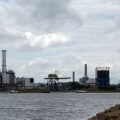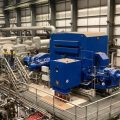Tata Steel’s Port Talbot steel mill in South Wales is facing major job cuts after the British government announced an agreement to reduce its environmental impact and decarbonize its UK operations. This news has generated concern among the plant’s workers as they could suffer major labor losses.
The unions have pointed out that it is crucial that workers have a say in any agreement related to greener steel production at Port Talbot. This means that your opinion and perspective must be taken into account to ensure fair and equitable treatment for all involved.
The British government and the Tata company have reached a £1.2 billion agreement that could result in the elimination of around 3,000 jobs across the country. In addition, a company representative stated that Syndex specialists will be given full transparency and allowed time to complete their findings.
Steelworks has secured £500 million in funding, but this may not be enough as an estimated 3,000 jobs are at risk of disappearing. Although the steel mills are being financed, local residents are concerned about what the future holds.
According to GMB official Charlotte Brumpton-Childs, it is important that Tata does not insulate itself from finding solutions that will make the industry greener without resorting to layoffs. This means they must look for sustainable alternatives to improve their environmental impact without affecting their employees.
“This agreement is not and should not be a fait accompli: workers must have a say,”
he said. He reported that this meeting was the beginning of a time-consuming process of consulting with employees on job cuts.
A Tata Steel representative stated that they are confident that their proposal to invest £1.25 billion for green steel production in Port Talbot will not only secure jobs, but will also strengthen the UK steel industry and contribute to developing a more sustainable environment in the region.
“We are committed to meaningful consultation with our union partners on these proposals and will listen carefully to their concerns,” he remarked,
he remarked.
What are Tata’s objectives for the city of Port Talbot?
Ending blast furnace production at Port Talbot is seen as an important step in reducing emissions from the UK steel industry. The site houses two large furnaces that operate continuously to produce steel that is used in a wide variety of products, from cans to automobiles.
Port Talbot, the largest plant in Wales, is responsible for much of the pollution in the region. It produces about two tons of carbon for every ton of steel it manufactures. On the other hand, the British government has earmarked a sum of up to 500 million pounds for Tata’s emission reduction project. This money will be used to install new electric arc furnaces. For its part, Tata had previously committed a further £750 million for this purpose.
Today’s blast furnaces produce steel used in everything from cans to automobiles. However, the proposed new 1.25 billion pound furnaces melt scrap to form recycled steel. They are also expected to begin operations within a maximum of three years after obtaining the necessary approvals from the regulators and completing the planning process. Finally, the company confirmed that there will be a transition period in which a thorough reorganization of the plant is likely to take place.















